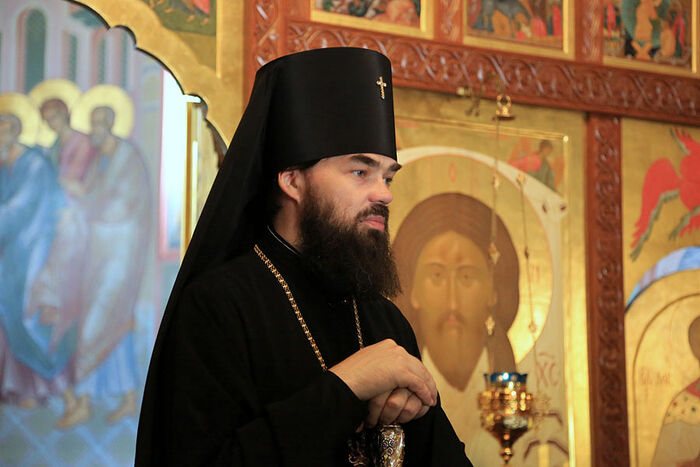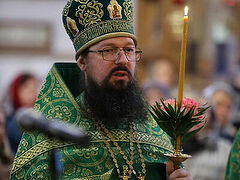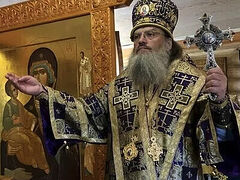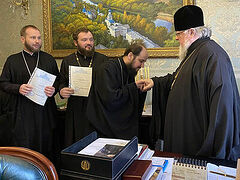Gorlovka, Donetsk, June 3, 2022
His Beatitude Metropolitan Onuphry of Kiev and All Ukraine understands that there are dioceses that don’t approve of the resolutions from last Friday’s Council of the Ukrainian Orthodox Church and the changes introduced into the Church’s Statutes, and has blessed them to continue to live according to the old Statutes, including commemorating His Holiness Patriarch Kirill in the Divine services.
Thus, as His Eminence Metropolitan Mitrophan explained to parishioners after Friday’s Council, his Diocese of Gorlovka and Slavyansk maintains its unity both with the Russian Orthodox Church and the Ukrainian Orthodox Church.
OrthoChristian earlier reported on three dioceses in Crimea and Donetsk that have expressed the same stance, and they have subsequently been joined by the Crimean Dzhanskoy Diocese as well.
Meanwhile, as of Sunday, Met. Onuphry has stopped commemorating Pat. Kirill as the hierarch above him, but instead reads the diptychs of primates, according to the practice of the primates of the autocephalous Local Churches. Two days later, the Rovenky Diocese announced that it would commemorate the Patriarch, but not Met. Onuphry, though it didn’t make any claims to breaking from the Ukrainian Church.
Audio of Met. Mitrophan of Gorlovka’s address to parishioners, offered against this background, was published on the Cleric News (КЛИРИК НЬЮС) Telegram channel on May 31. His Eminence recalled the proceedings of the day’s various meetings and Councils and explained how the results affect life in his diocese, which is located in the contested Donetsk People’s Republic and has experienced serious fighting.
According to Met. Hilarion, dioceses located behind the frontline, including Donetsk, Kherson, Izyum, Crimea, and others were invited to participate in an online format in the meeting of hierarchs, clergy, monastics, and faithful that began the day last Friday in Kiev. Altogether, 12 dioceses participated online.
They first spoke about the difficult circumstances that the UOC is currently facing, including that there is a movement in the Verkhovna Rada to completely ban the Church throughout the entire country. And, as Met. Hilarion recalled, clergy from various dioceses then addressed Met. Onuphry about declaring no confidence in Pat. Kirill for not speaking out against the war.
Then, Met. Mitrophan himself addressed the meeting, emphasizing that the war hasn’t been going on for 3 months, but for 8 years already. His diocese has suffered not only destroyed churches, but many people have been killed, “and no one who lives here has any doubts about whose shells killed them,” the Metropolitan said.
But he’s never considered the idea of suspending commemoration of Met. Onuphry for not getting Poroshenko or Zelensky to stop the fighting, as people are demanding of the Patriarch today.
“This is an argument our people won’t accept and which they won’t agree with, and on the basis of this argument we can’t express any distrust of the Patriarch, and if we express distrust of the Patriarch, we must first express distrust of ourselves. Start with yourself,” Met. Mitrophan said.
“As it seemed to me,” Met. Mitrophan continues, the majority of those who spoke, especially the clerics and monastics, including from central and western Ukraine, were against changing the Church Statutes.”
After everyone had a chance to speak, Met. Onuphry suggested that if they want to make changes to the Statutes, they should hold a Bishops’ Council and then a Council of the Ukrainian Orthodox Church, which has the right to amend the Statutes. According to Met. Mitrophan, the majority voted in favor of this proposal, of changing the status from a meeting to a Council.
According to the prescribed procedure, there should first be a meeting of the Holy Synod which would call for a Bishops’ Council to discuss the issues that will be further discussed at a Council of the UOC. Then dioceses are to discuss the issues and elect delegates to send to the Council of the UOC, where changes can be made to the Statutes.
Met. Mitrophan emphasized, this all happened in “express” mode, within the span of a few hours.
As he recalled, those dioceses participating online were not involved in the Bishops’ Council, after which they began to read aloud the proposed changes to the Statutes, including the removal of any mention of unity with the Russian Orthodox Church. Met. Mitrophan voted against all these changes and against the vote of no confidence in the Patriarch.
Had he voted for the changes and resolutions, it would have been a betrayal of his clergy and people, he emphasized. “I wouldn’t be able to look them in the eyes then and tell them that we’re not going to commemorate the Patriarch anymore.”
Thus, Met. Onuphry suggested that Met. Mitrophan and other dioceses with the same position can do what they want and consider necessary. They aren’t forced to suspend commemoration of the Patriarch.
After the Council in Kiev, Met. Mitrophan held a clergy meeting in his diocese, where he explained everything that happened at the Council, and the clergy agreed with the position taken by their hierarch. And because the Russian Synod responded with understanding about what pressure the UOC is under and didn’t condemn the Church, the Gorlovka Diocese will therefore continue to commemorate both the Patriarch and Met. Onuphry.
As Met. Mitrophan explained to his clergy, the Council resolutions give him the right as the diocesan hierarch to make such important decisions concerning the life of his diocese.
While he strongly disagrees with the Council’s decisions, Met. Mitrophan intends to maintain unity:
Of course, I’m not happy about it. I don’t think it’s good. I think this decision was incorrect. And I’m not just saying this now—I said it at the Council, and it’s incorrect for many reasons. Not just because very many people, including in central and western dioceses disagreed with this decision, and consider it incorrect. Whether you like the Patriarch or not, or what he says, or conversely, doesn’t say, to break the unity of our culture, 1000-year history, to break the unity of the entire Church structure because of the current political situation, or because it could be scary—it’s an incorrect decision. I don’t support it, don’t approve of it. But also, as for me, I’m not going to do anything to bring harm to our Orthodox clergy, brothers and sisters who are serving in more difficult conditions than us today. Therefore, we commemorate Met. Onuphry, and we also pray for our brothers, and we commemorate His Holiness the Patriarch. Nothing has changed for us.
The Metropolitan then explained that he couldn’t vote for no confidence in the Patriarch especially considering how much he has done to arrange for humanitarian aid to be sent to areas affected by the war. He especially recalled the Patriarch’s pivotal role in getting more than 100 civilians evacuated from the Azovstal plant in Mariupol.
The Patriarch hasn’t forgotten the people, and it’s not true that he’s sitting around doing nothing, Met. Mitrophan emphasized. Thus, the Gorlovka Diocese will continue to commemorate him, and won’t go into any schism or division.
“And I hope that with God’s help, we’ll manage to also preserve unity with the Ukrainian Orthodox Church. We live according to the old Statutes that existed before the Council that was held on Friday,” the Gorlovka hierarch said.
Thus, the people should calmly pray for both the Patriarch and Met. Onuphry, and pray that no further steps be taken that could disrupt the unity of the Russian and Ukrainian Churches, Met. Mitrophan exhorts.
Follow OrthoChristian on Twitter, Vkontakte, Telegram, WhatsApp, MeWe, and Gab!





